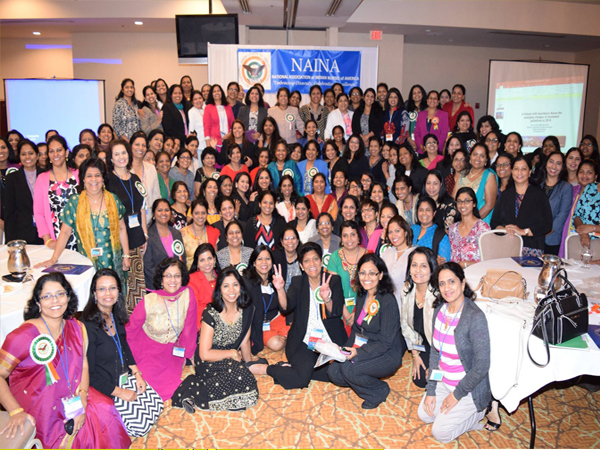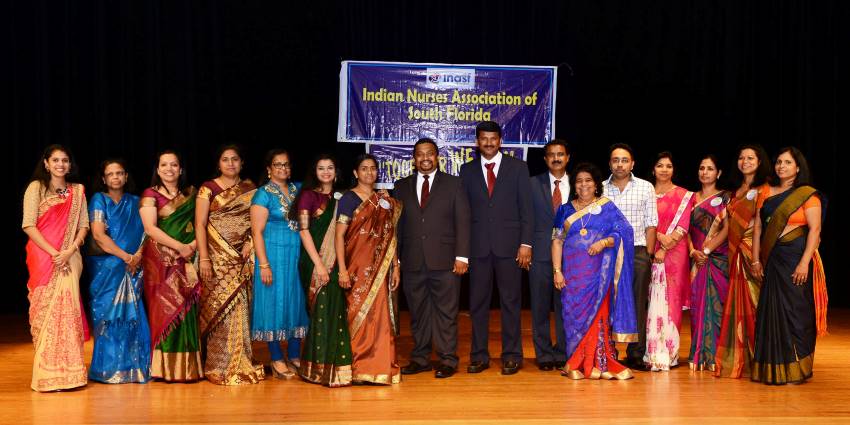BY AJAY GHOSH
“On a rainy Sunday morning last weekend, we had just finished breakfast. I was happy that I was able to make Appam and egg curry (a traditional south Indian delicacy) for breakfast after many months. I sat on the couch and was checking the messages on my phone,” Mary (name changed for the report), who is an RN at a large hospital in the state of Connecticut recalls. “I was shocked to learn that a 41-year-old male patient I had admitted and had taken care of for over a week has come positive for Covid-19, the deadly virus that has affected over a million people in the United States alone.”
This is not the first patient Mary had worked with for weeks/days, not knowing that the patient had hidden symptoms of Covid-19 since the pandemic broke out over two months ago. The fear of being exposed to the symptoms while serving patients who are not diagnosed with but carry the virus, has been devastating.
Mary does not work on a Unit assigned to work with Covid positive patients, but has been unknowingly caring for many such patients, risking her own life and that of her family. Mini was called to work on the Corona Units, which have now come to be occupying entire five Floors in addition to the ICU/EDs in her hospital because of an overwhelming flow of people diagnosed with the deadly virus.
The lack of adequate tests for coronavirus leads to healthcare professionals, who are the heart and soul of the healthcare delivery system, being exposed to and being infected themselves and endangering the safety of their loved ones at home. “It’s a nightmare going to work,” Mini says. “Seeing my colleagues one by one falling victim to this virus has made me nervous about going to the hospital every morning.”

“A vast majority of the nearly two dozen clinical staff on my Unit have become positive for the virus,” Mary reports with anxiety and fear. “One of my colleagues, with whom I have worked for over a decade has been in the ICU for over two weeks now, struggling for her life. Another colleague, and everyone in her family has been positive for the virus. Many others from my Unit are still recovering or struggling to recover from the deadly virus that has taken away nearly 60,000 lives in the country.”
Mary herself had shown symptoms that go with people diagnosed with Coronavirus, and has been self-quarantining for the past six weeks, mostly isolating in her room after work and with minimum contact with her husband and their three daughters.
The experiences of Nurses who are in the front line caring for patients have been traumatic to say the least. Sumana Gaddam, President of IANA-North Carolina, says, “Nurses are the life and soul of the healthcare profession, providing comfort, kindness, and care to patient’s every day. It’s indeed a challenging job that requires hard work, dedication, and a very thick skin. Nurses are the ultimate healthcare monitors – vigilant observers and problem solvers, poised to take action whatever the challenge. Our mindset is one of preserving the unique attributes of our roles while embracing the progress that helps us excel.”
During this pandemic affecting the entire world, the role of Nurses has become even more challenging in every possible way. Ciji, an ER Nurse at a local hospital in the state of Connecticut says, “When I first heard about Covid-19, I never in my wildest dreams thought it would be this bad.”
Challenges of working with the Covid patients is not limited to work alone. “Since the first day of caring for Covid patients, I had isolated myself at home. I am very concerned about the safety of my family as I could bring this virus home any day with me. I have my kids, husband and more importantly my elderly parents who are vulnerable to this virus. I want to keep them safe.”
Describing her work and the challenges at work, Ciji says, “The stress level at work is unprecedented. We work hard to keep people alive. It’s painful and traumatic to watch my patients die without being allowed to see their loved ones even at death bed. Working in ICU wearing N95 mask for 13 hours gives me terrible headaches. I get home and cry in the shower because I don’t want my family to see it.”
Experiencing this self-isolation for weeks takes a toll on Ciji and the entire family. “I wish to hug my kids but I can’t. My 3-year-old daughter knocks at my bedroom door but I can’t open the door to let her in. You will only be able to understand this pain when you go through it,” Liji says with tears rolling down her eyes.
Ciji’s experience is shared by numerous colleagues around the nation and world. Shyla who works in the Medical ICU at a leading healthcare facility in Connecticut says, “In the past few weeks, the entire unit is filled with only COVID patients now. The large ICU has been turned into exclusively for treating COVID patients, calling it now Covid-ICU.”
Describing that all the patients with are “extremely sick, and most of them are on the Ventilator for weeks now, it is very depressing to work with patients during this pandemic,” Shyla says, “We are working hard all day and night, don’t see the progress in several patients.”
“It’s even more stressful when I return home after serving the patients in the hospital. My kids, particularly, my 2-year-old Jace is always waiting at the door and wants to come to me, but I am running away from him to my room for fear of infecting my precisions children and husband with the virus. It’s heartbreaking, when my little Jace knocks on my door and asks, “Where are you?” My life has turned upside down. After working in ICU at the hospital, I am isolating myself in my room in the house.”
Kavya from Long Island, New York who works in a Rehabilitation Unit at a local hospital says, “Now we are treating only post Covid patients on my Unit. Among all the patients and negative news about the losses, I was glad to discharge a 68yrs old patient home last week. He had come to the hospital for kidney transplant, and had subsequently developed Covid and was faced with several complications.
There are several Nurses who have sacrificed their lives while caring for the patients with Covid 19. Aleyamma John, 65, a registered nurse at a New York City Queens Hospital Center, passed away on Tuesday, April 7. She began her career at Parker Jewish Institute for Health Care and Rehabilitation, before moving on to the NYC Health + Hospitals system in 2003.
“We honor Aleyamma’s record of service to the patients of New York, and her career spanning record of National Association of Indian Nurses of America (NAINA) membership and participation,” Agnes Therady, RN, and currently serving as the President of NAINA, the foremost organization for all professional nurses of Asian Indian heritage in the US since 2006, said.
These Nurses are among the thousands of Registered Nurses of Indian Origin in the New York Tri-state area and around the nation who have been in the forefront providing professional nursing care to thousands and thousands of COVID-19 patients.
Nursing has an incredible journey, from where nurses used the second hand of a wristwatch to calculate IV drip rates, universal precautions didn’t exist and nurse lived by the kardex, a roadmap to all things for the patient care to present time where it is highly specialized in every aspect of health care delivery, education, research, and policy formation.

Nursing
is a much broader career now and plays a key role at all levels of health care.
Today, we are more likely to find an RN teaching at a university, conducting
research or occupying hospital administrative positions than we were a decade
ago. At the same time, preserving and practicing the time-honored skills of
listening, therapeutic conversation, and personal touch in caring for patients
and families.
Sumana
Gaddam rightly points out, “Nurses aspire to create a kind of culture that
“Everyone Matters”, a culture that puts people first and where true success is
measured by the way we touch the lives of people in which all members can
realize their professional and personal gifts matters and share those gifts
with others. Everyone matters is about everybody’s value, that we all count,
that we all should stand tall for who we are, as we are. At the end, it is
about truly caring for every precious human being whose life we touch. It’s all
about bringing our deepest sense of right authentic caring and high ideas to
this association.”
According to the Bureau of Labor Statistics’ Employment
Projections 2016-2026,
Registered Nursing (RN) is listed among the top occupations in terms of job
growth through 2026. The RN workforce is expected to grow from 2.9 million in
2016 to 3.4 million in 2026, an increase of 438,100 or 15%. The Bureau also projects the need for an additional
203,700 new RNs each year through 2026 to fill newly created positions and to
replace retiring nurses.
In the July 2017 Journal of Nursing Regulation, Dr. Peter Buerhaus and colleagues project an accelerating rate of RN retirements with one million RNs expected to retire by 2030 and that “the departure of such a large cohort of experienced RNs means that patient care settings and other organizations that depend on RNs will face a significant loss of nursing knowledge and expertise that will be felt for years to come.”
As U.S. health care facilities struggle to fill current registered nurse staffing vacancies, a more critical nurse undersupply has been foreseen over the next few decades. In response, many institutions are doubling their efforts to attract and retain nurses, and many more Nursing Schools are opening up and the existing schools are expanding their programs accommodating more students. In the interim, foreign nurses are increasingly being sought, creating a lucrative business for new recruiting agencies both at home and abroad.
Nurses who migrate from India to the US undergo both socio-cultural and workplace adjustments. They deal with loss, change and sacrifice. Workplace adjustments include communication issues, dealing with a new healthcare system and adapting to an expanded role of nurses. However, in a very short time, they adapt and master the skills and shine as the best among the Nursing community.
The United States, while not the world’s largest recruiter of foreign nurses, is recruiting greater numbers than it ever did in the past and is poised to greatly increase those efforts. During the past fifty years the United States has regularly imported nurses to ease its nurse shortages. Although the proportion of foreign nurses has never exceeded 5 percent of the U.S. nurse workforce, that figure is now slowly rising.
After slowing in the second half of the 1990s, nurse migration to the United States increased, with the Philippines still leading the way for an even larger group of countries. After 1998 the foreign nurse proportion steadily grew, topping 14 percent in 2003. The growth since 2001 is particularly noteworthy because it occurred as the number of U.S.-trained RNs rose, reversing declines since 1995.
Although foreign-trained nurses now account for around 5 percent of the total U.S. nursing workforce, they represent a growing percentage of newly licensed nurses. However, as jobs have become harder to find in the US market, the immigration process has been put on hold. With this, the Nursing professionals from India and many other nations around the world have begun to face an uncertain future but by driving toward the changes in future in a proactive strategy, they can be better prepared to meet the challenges.
Nurses from India and those of Indian origin have made an impact on the patients they care for. In recent decades, the US has been looking to India to alleviate its shortage for nurses as Indian schools are churning out professionals matching American standards. “India is now being recognized as an area which offers bachelor-degree nurses and a good health care system with an abundance of nurses,” Mary Prascher, HRD manager at Texas- based Triad Hospitals was quoted as saying by the Dallas Morning News. . ”It is the next revolution,” said Sujana Chakravarty, secretary general of the Trained Nurses Association of India, a trade group in New Delhi. ”And nurses are already outwitting software programmers by getting paid a lot better.”
Indian American Nurses like the physicians serving millions of patients in the US, have come to be known for their compassion, dedication and clinical skills, touching thousands of lives daily. Nurses educated in India make up one of the largest groups of internationally educated nurses in the United States. Internationally educated nurses from India is the third largest group of internationally educated RNs serving patients in the country.
Johns Hopkins University nursing ethics expert Cynda Rushton, interviewed on the hub.jhu.edu website, correctly said, “It’s a time of great stress and uncertainty, and nurses are rising to the challenge.” A few weeks ago, she helped create the Frontline Nurses Wikiwisdom Forum, a virtual safe space where nurses can share their challenges and experiences during COVID-19, the news report said.
Rushton sums up the role of today’s nurses in these words in her interview -“Nurses are often the last thread of compassion for patients. They’re the ones doing the screenings, taking care of the critically ill, implementing triage protocols, communicating to families, and attending to the dying. Nurses in every role are impacted. They’re being asked to work in areas of the hospital that aren’t their normal specialty.”
While expressing deep sorrow for the loss of Asian American Nurses and several others, who have been diagnosed with Covid positive, Agnes Therady says, “As we look to the future, I am confident that we can work together to improve our lives and that of others, innovate our practice, and rise to the top as authentic leaders and exceptional nurses. The success of NAINA is largely driven by the dedication and commitment of its members, their countless hours of selfless service and hard work.”
Nurses such as Mary, Shyla, Ciji and Kavaya continue to play a critical role in alleviating patients of their illnesses, especially during this time of pandemic. They are showing the way for many others from Indian and other nations to come and continue to provide critical care to the patients in this country. While they are in the forefront treating patients and impacted by the struggles of the patients, and being isolated in their own homes, away from their loved ones, for fear of bringing home the virus from the hospitals they are committed to serve, they are hopeful and are satisfied that they touch so many lives daily, giving them health and hope.
Paul, a Nursing Administrator from Long Island says, “Nervousness, anxiety and fear initially overwhelmed those who were called upon to respond to those fighting for life. As they provided care and comfort, many of them themselves became ill and recovered. They became more resilient, proud and altruistic.”
Shyla says, “It was very stressful in the beginning, and now we have come around to accept the reality.” A devout believer in God and in her Faith, Shyla believes, “When I help and do the services for these most vulnerable people during this pandemic, God will protect Me and My Family.”
During these testing times, it’s a challenge to stay positive at work and at home. Kavaya and her husband who also works in the healthcare field were both positive for Covid. They have now recovered from the deadly virus and have returned to work. Kavya says, “I hope we have some antibodies at home. My two daughters are doing their on-line classes, which they are not excited about. But this is the new reality we have to live with day in day out.”
Ciji is proud that she has been able to help patients, especially in this critical time. “Nursing is my calling. When my duty calls I can’t fail. There is a light at the end of the tunnel. I wish and pray for this situation to get better so that the people can be safe and I can be with my family.”





